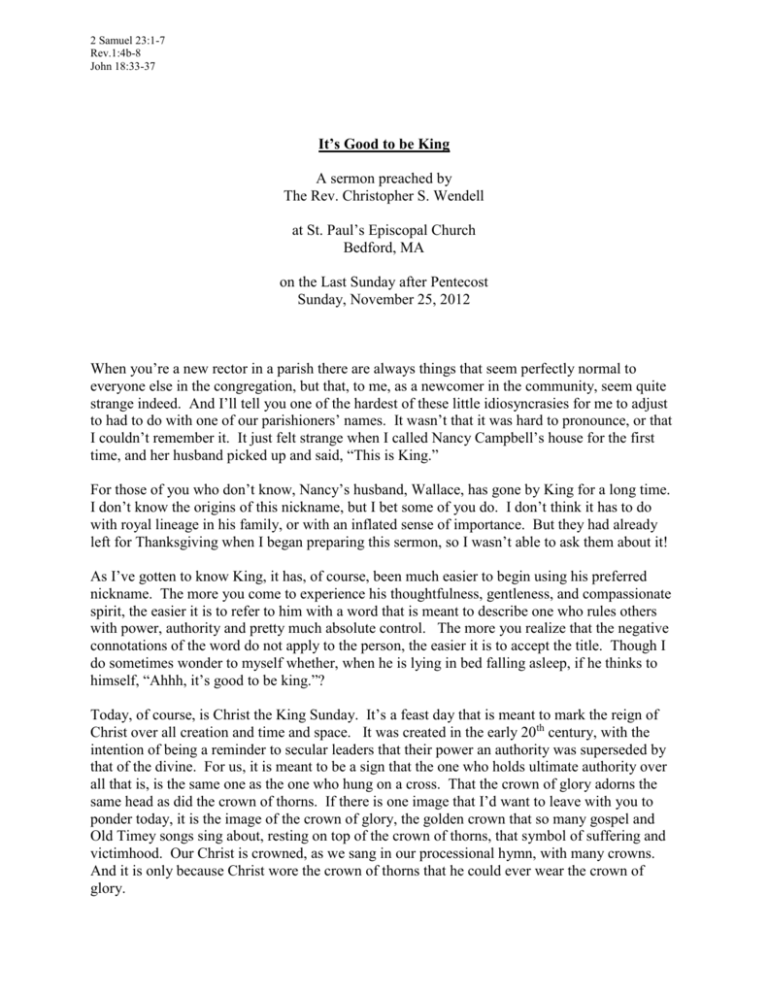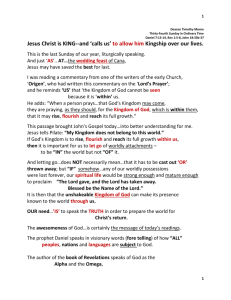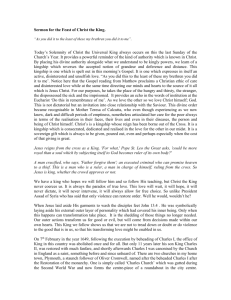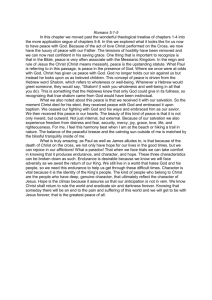11-25-12 It`s Good to be King
advertisement

2 Samuel 23:1-7 Rev.1:4b-8 John 18:33-37 It’s Good to be King A sermon preached by The Rev. Christopher S. Wendell at St. Paul’s Episcopal Church Bedford, MA on the Last Sunday after Pentecost Sunday, November 25, 2012 When you’re a new rector in a parish there are always things that seem perfectly normal to everyone else in the congregation, but that, to me, as a newcomer in the community, seem quite strange indeed. And I’ll tell you one of the hardest of these little idiosyncrasies for me to adjust to had to do with one of our parishioners’ names. It wasn’t that it was hard to pronounce, or that I couldn’t remember it. It just felt strange when I called Nancy Campbell’s house for the first time, and her husband picked up and said, “This is King.” For those of you who don’t know, Nancy’s husband, Wallace, has gone by King for a long time. I don’t know the origins of this nickname, but I bet some of you do. I don’t think it has to do with royal lineage in his family, or with an inflated sense of importance. But they had already left for Thanksgiving when I began preparing this sermon, so I wasn’t able to ask them about it! As I’ve gotten to know King, it has, of course, been much easier to begin using his preferred nickname. The more you come to experience his thoughtfulness, gentleness, and compassionate spirit, the easier it is to refer to him with a word that is meant to describe one who rules others with power, authority and pretty much absolute control. The more you realize that the negative connotations of the word do not apply to the person, the easier it is to accept the title. Though I do sometimes wonder to myself whether, when he is lying in bed falling asleep, if he thinks to himself, “Ahhh, it’s good to be king.”? Today, of course, is Christ the King Sunday. It’s a feast day that is meant to mark the reign of Christ over all creation and time and space. It was created in the early 20th century, with the intention of being a reminder to secular leaders that their power an authority was superseded by that of the divine. For us, it is meant to be a sign that the one who holds ultimate authority over all that is, is the same one as the one who hung on a cross. That the crown of glory adorns the same head as did the crown of thorns. If there is one image that I’d want to leave with you to ponder today, it is the image of the crown of glory, the golden crown that so many gospel and Old Timey songs sing about, resting on top of the crown of thorns, that symbol of suffering and victimhood. Our Christ is crowned, as we sang in our processional hymn, with many crowns. And it is only because Christ wore the crown of thorns that he could ever wear the crown of glory. 2 Samuel 23:1-7 Rev.1:4b-8 John 18:33-37 It’s worth thinking for a moment what that means exactly. What is it about Christ’s experiences of suffering a victimization that makes his kingship different? It isn’t just that sorrows and pain of Jesus’ agony and crucifixion that validate his glorification. Simply being a victim is nothing to glorify. Rather what we glorify about Jesus’ suffering is that he never let his victimization corrupt the generosity and compassion that were the hallmark of his true identity. No matter how painful the wounds were that the soldiers inflicted, how deep the betrayal of his closest disciples, or how long his suffering upon the cross, Jesus’ commitment to forgiveness and compassion never wavered. His response to being a victim was not to become embittered, to rage against the world or even his tormentors with unbridled hate, to vow revenge as a means of coping; rather he remained committed to his course of reconciliation and healing. This empathy with victims, with those whom powerful people use, abuse, and discard, is what makes his kingship unlike any other kind of kingship. The way that Jesus’ authority and power operates in the world is so different than the way worldly kingship works. Kings on earth use power and authority coercively. Jesus uses power and authority persuasively. Earthly kings use fear of punishment as the ultimate tool to encourage obedience to their rules. Jesus uses attraction to the good, the right, the holy, as the ultimate tool to encourage obedience to God’s rule. The difference could not be more stark: Rulers who teach us to fear being bad because of its consequences, versus a God who teaches us to love being good because of its beauty. This is the kind of kingship Christ embodies, the kind of rule he offers. Now, if you’ve never met a king like that before, it is easy to understand why you might be uncomfortable with calling anyone a king – let alone calling them your king. Who would ever, in the right mind, want the first kind of king? No one. That’s why earthly kings have to use force and armies and such to secure their rule. No one would voluntarily submit to such control. If the only kind of authority that has had meaning for you in life has been this first kind of authority – coercive, unchosen, and self-centered – then it’s not surprising that you might have some concerns about calling Jesus Christ a King…let alone your king. Just like when I met the Campbell’s, I had to get to know Wallace before it became easy to call him King, so too, I had to get to know Jesus a little bit before I became comfortable using this language of King about him. I had to realize that the kingship we talk about in church is radically different than the kingship of the world. That the God who wears the crown of glory is the same God who wore the crown of thorns. Perhaps this discomfort is true for some of you, too. Perhaps it was hard to become comfortable using the word King (or Lord) as a title for Jesus. Maybe for some of you it still is strange…or even uncomfortable. I understand that. To voluntarily call someone a king, especially your king, requires a deep level of trust and respect. And in many places in the Christian universe, the church has done very little to earn that trust – instead using Christ’s Kingship as a theological justification for male domination of the household. If Christ is the King of the Universe, then the man is the king of the family, and if you are not the “man of the house” because you are too young or too old or too female, then you are to obey. Perhaps some of you have experience with this kind of thing. If you are, I’m so sorry, because that logic honors neither the dignity of every human being, nor the tremendous gift that was Christ’s forgiveness from the cross. The Christ who refused to seek vengeance, refused to compel punishment on those who did him harm, is the same Christ who 2 Samuel 23:1-7 Rev.1:4b-8 John 18:33-37 rules the universe not with coercion or domination, but with love and with hope that others will be attracted to his same rejection of violence. Using Christ’s Kingship to justify your own rule over anyone is bad theology, bad ethics, and harmful behavior. But even if you haven’t had this kind of negative experience, it still might seem strange to call someone a King. After all, King Campbell never did anything bad to me, but even so it felt awkward to call him King until we got to know each other a little bit. Maybe that’s true for us and Jesus too? Maybe we have a hard time with this King language because we don’t know him well enough yet. We don’t trust that his rule is entirely voluntary. We don’t really yet appreciate the depth of his personal commitment to compassion and mercy, and his rejection of violence or coercion. We don’t yet come to believe that his authority might be a real touchstone for our lives – helping us to find purpose, meaning, and value in a life dedicated to something beyond ourselves. If that’s not the Jesus you know yet, that’s ok. He’s not upset with you. And Guess what? He’s dying to meet you! Or, I should say, he’s living to meet you. Living, and forgiving, and offering a reign of compassion and love in his Kingdom for all in the world to discover. Citizenship in Christ’s Kingdom of Love is voluntary and open to all. You just have to want belong. The only requirement is your desire. Amen.








